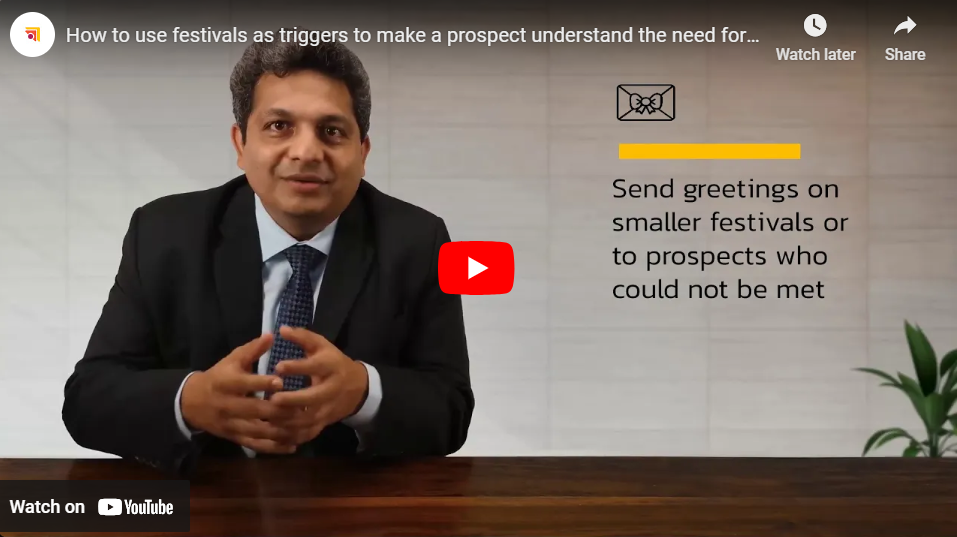Find your suitable insurance plan





1342
6 min read
Every year, people in India and Indians across the globe eagerly await the festival of lights, Diwali. It is undeniably the biggest festival in India, having immense significance. Like other festivals, Diwali also teaches us many lessons. These lessons are reflections of virtues, morals, peace, and joy, which we embrace in our lives. Diwali connotes the triumph of good over evil and righteous over wicked.
Along with the teachings of morality, Diwali signifies the importance of a balanced existence of moral and financial investment lessons, which are crucial for our existence. There are many key financial aspects to learn and imbibe from each of the five-day Diwali celebrations. As Diwali also marks the start of a new financial year as per the Hindu calendar, many key traditions of the festival revolve around monetary implications.
Let us understand the valuable financial lessons imparted by the Festival of Lights for the investor community and people in general.
Dhanteras marks the start of the Diwali celebrations in India. As the name connotes, ‘Dhan’ signifies wealth, whereas ‘Teras’ means the number thirteen. This is a day associated with the tradition of purchasing gold, silver, and other valuable assets. The day falls on the 13th day of the lunar calendar of Krishna Paksha every year and is also called ‘Dhanavantri Trayodashi’ and ‘Dhanatrayodashi’.
As hinted by the name, Dhanteras is regarded as an auspicious occasion for buying metals or assets. On this day, the goddess Lakshmi is worshipped by devotees for wealth and prosperity. Buying precious metals on Dhanteras is believed to bring fortune and good luck to people. Hence, this festival teaches a valuable lesson about saving and investing in valuable assets.

The second day of Diwali celebrations, called Choti Diwali or Narak Chaturdashi, is observed in the month of Karthik on the Chaturdashi tithi. This day is celebrated to rejoice in the conquest of goodness over greed.
In many parts of India, this day is marked by clearing old debts and planning new beginnings with fresh investments. Most business owners prefer to clear their accounts on this day. Managing debts responsibly is essential as it allows controlling credits through budgeting and financial planning. Hence, planning in a disciplined way with determination plays a noteworthy role in overcoming debts and having full control of your finances.
Here are some financial tips on how to plan debt repayment for the best monetary stability:
Whatever way you choose, stay disciplined, as debt repayment and financial stability require patience and a disciplined approach.
The third day of Diwali is the auspicious occasion of worshipping lord Ganesh and Goddess Lakshmi. As per traditions, both these deities are associated closely with wealth and prosperity, denoted as ‘Shubh’ and ‘Labh’. Hence, people worship these deities on Diwali to have a fulfilling and prosperous life filled with affluence. As per the common belief that the goddess Lakshmi enters a clean and nicely decorated house, it is a tradition to clean and decorate homes during Diwali.
Similarly, the day marks significant importance in budgeting and planning for financial discipline and to clean any financial roadblocks. Budgeting is an excellent way to inculcate discipline in financial guidance and to allocate savings for particular goals. With a balanced budget, you can manage to fulfil needs with the available income while not deterring your focus to save for the future.
Since Diwali is a day to spend on yourself and your dear ones, ensure to make this an occasion for setting a budget for the different milestones in your life. This helps to avoid overspending and aim for a diversified investment portfolio to deal with future risks.
Govardhan Puja is celebrated just after Diwali all across the country in reverence to the Govardhan Parbat. The Parbat is highly esteemed for saving thousands of lives from harsh weather conditions and rain. History has it that Lord Krishna lifted the Govardhan Hill on his little finger to protect his pupil from the wrath of Lord Indra, the god of rain and the regent of the heavens. Hence, the day is devoted to the worship of Lord Krishna and in preparation for ‘Chappan Bhog’ or 56 types of dishes to pay respect to lord Krishna and the mountain.
The story of Govardhan Parbat saving people during a time of difficulty teaches the importance of risk management, which empowers individuals and firms with the right tools to identify potential risks and mitigate them. Besides, risk management is also significant to base your understanding of your financial situation and to make sound monetary decisions. Estimate future expenses and verify risks while planning investments to make informed financial decisions.
Having financial safeguards is extremely important to ease unforeseen risks and emergencies. Hence, it is important to save for emergency funds as a part of healthy financial planning to sail through the tough times of income loss and unexpected expenses.
Bhai Dooj is a celebration observed a day after Badi Diwali, and it completes the 5-days of joyous festivities. Indians all over the globe celebrate this occasion with enthusiasm and fervor. The celebration portrays the close bond shared by siblings. This is an occasion when siblings exchange gifts and prayers.
This is also the time of family and sibling bonding and is a momentous occasion to discuss vital financial matters. Such discussions promote transparency and communication in a family and enhance the ties of kinship further.
Here are some tips on building a robust financial support system within the family:
Conclusion:
Diwali teaches several significant lessons on managing finances. Whether you are a beginner at investment or laden with financial burdens, Diwali is an occasion that encourages everyone to spend carefully and save logically to mitigate risks. It teaches us to make the right decision to support financial goals in the long run. These lessons should be imbibed and implemented in life to sync your objectives with your financial planning.
Overall, Diwali is a great time to enjoy as well as contemplate opportunities for financial growth and wisdom. So, let’s celebrate this Diwali with all the fun and frolic to have a sparkling time planned and secured with financial freedom.
Browse PayBima Blogs to read interesting posts related to Health Insurance, Car Insurance, Bike Insurance, Term Life Insurance, and Investment section. You can visit PayBima to Buy Insurance Online.

PayBima Team
PayBima is an Indian insurance aggregator on a mission to make insurance simple for people. PayBima is the Digital arm of the already established and trusted Mahindra Insurance Brokers Ltd., a reputed name in the insurance broking industry with 17 years of experience. PayBima promises you the easy-to-access online platform to buy insurance policies, and also extend their unrelented assistance with all your policy related queries and services.
Diwali is an important and most awaited celebration in India. If you are lucky enough to celebrate your anniversary during Diwali, you are up for.
Diwali is a time of creating memories to last forever. Memories like festive anecdotes and glimpses of a fun-filled time amidst happiness and laughter. However,.
Diwali is just around the corner. It is a tradition to give and receive gifts among close family and friends during Diwali. There is a.
Diwali celebrations have become synonymous with fireworks. Without firecrackers, Diwali seems unimaginable. Fireworks do add a dash of pleasure and excitement to the Diwali festivities.
Diwali is a joyous occasion to celebrate amidst love, blessings, laughter, and fireworks. Yes, firecrackers are a pivotal part of Diwali celebrations, enjoyed by children.
Diwali is a joyous occasion celebrated by people all over India and by the Indian diaspora worldwide. It is a five-day celebration marked by feasts,.
Festivities and celebrations are a part of Indian culture. People in India love celebrating various occasions with their families amidst laughter, lavish meals, and fun.
Every year, people in India and Indians across the globe eagerly await the festival of lights, Diwali. It is undeniably the biggest festival in India,.
Speak to our advisor
Mahindra Insurance Brokers Limited (A Mahindra Group Company) - Unit-202, A-Wing, 2nd Floor, Amiti Building, Agastya Corporate Park, Kamani Junction, LBS Marg, Kurla West, Mumbai - 400070. Tel: +91 22 66423800
Licenced by IRDAI License No. 261; License Validity : 17-05-2025; Category : Composite Broker; CIN : U65990MH1987PLCO42609 Member of Insurance Brokers Association of India (IBAI).
Insurance is the subject matter of solicitation.
For a seamless experience, use the latest version of Chrome/Firefox/Internet Explorer.
Copyright © 2024 Mahindra Insurance Brokers. All Right Reserved.
Verify your number to activate your best premium offer
Please enter the OTP sent to XXXXXX 4099 to continue